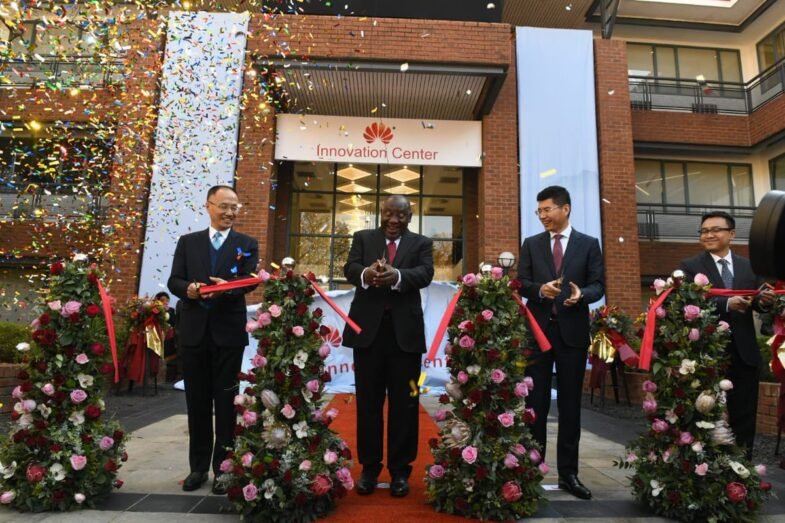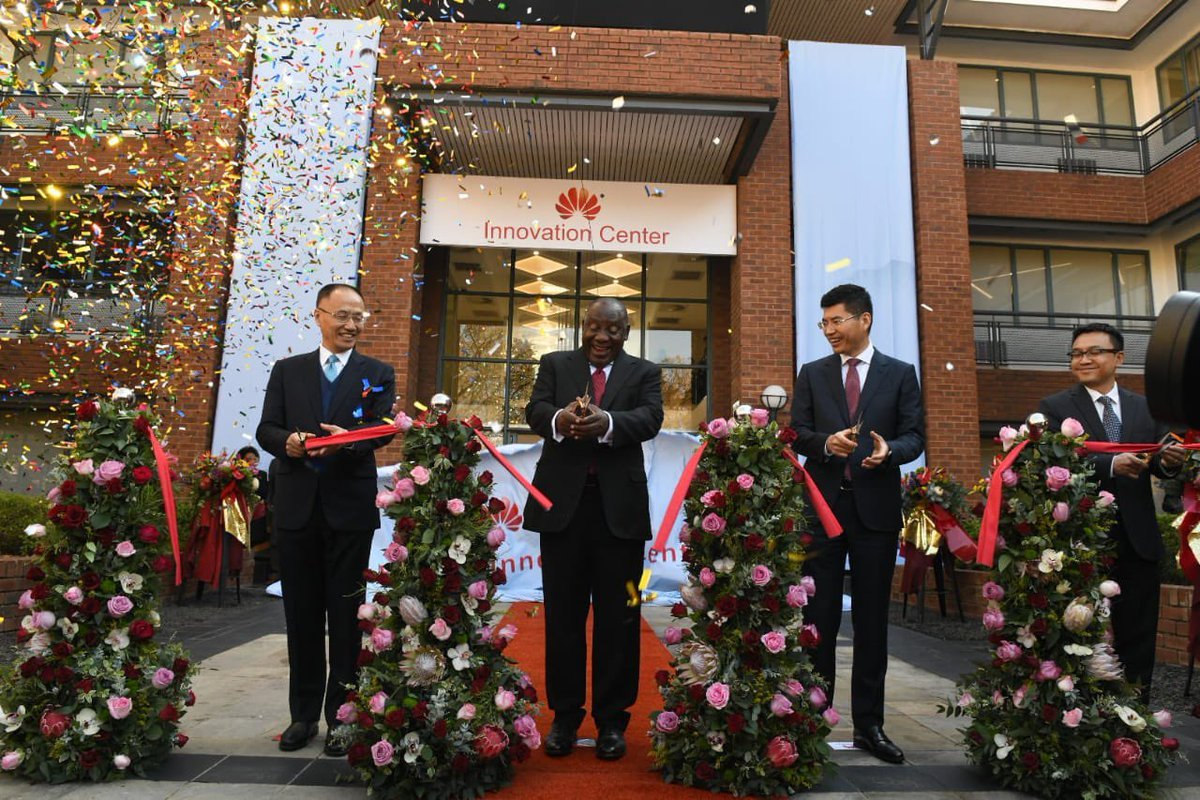Ramaphosa claimed that if Africa adopted Huawei’s cutting-edge technologies, it would “leapfrog into the Fourth Industrial Revolution.”

The opening of a new Huawei Innovation Center in Johannesburg was celebrated on Thursday by the president of South Africa, Cyril Ramaphosa, who praised the Chinese firm for having “confidence in the South African economy and its potential.”
Ramaphosa claimed that if Africa adopted Huawei’s cutting-edge technologies, it would “leapfrog into the Fourth Industrial Revolution.”
As a result of worries that Beijing was attempting to monopolise networks and potentially use them for espionage, then-President Donald Trump sanctioned Huawei in the United States in 2019. However, despite much of Africa’s poor connectivity, the company already has a significant digital footprint there.
Along with the president of Huawei sub-Saharan Africa, Leo Chen, and the Chinese ambassador, Chen Xiaodong, Ramaphosa attended the center’s opening.
“One of the main forces driving economic growth in South Africa is the expansion of the country’s digital infrastructure. Ramaphosa made the statement after touring the facility and taking in presentations from Huawei staff members. “The development of information technology is key to the competitiveness of our economy,” he added.
Strong ties exist between Beijing and Pretoria, with the latter having backed the struggle against apartheid in South Africa. Both nations are additionally part of the BRICS association of developing countries. Brazil, Russia, India, China, and South Africa collectively make up BRICS.
President Xi Jinping described science and technology as “a primary productive force, talent as a primary resource, and innovation as a primary driver of growth,” according to Ramaphosa, who used this quote in his speech. This is a feeling we both share.
He declared that the innovation hub would now put a strong emphasis on knowledge and skill sharing as well as developing local talent through a variety of initiatives. Additionally, he stated that it would concentrate on the growth of small, micro, and medium-sized enterprises, or SMMEs.
The innovation center, according to Ambassador Chen, “showed the Chinese private business sector and players are ready to stand by South Africa’s side to accelerate the 5G application,” according to a Huawei statement.
Leo Chen stated, “For my part, “The South African government’s compelling vision for the digital economy has inspired us. In areas like 5G deployment and 5G-driven industrial digital transformation, South Africa is emerging as both a regional leader and a global inspiration.”
Despite being the most industrialised nation on the continent, South Africa has a high unemployment rate. Ramaphosa expressed his hope that new local information and communication technology, or ICT, businesses would be launched with the aid of the Huawei Innovation Center to aid in job creation.
The president also expressed his approval of Huawei’s plans to invest in the African data centre and cyber security sectors.
A group of American lawmakers criticised Pretoria earlier this year for its ties to Beijing, including its use of Chinese technology. In South Africa, Telkom, a telecom company that is partially owned by the government, introduced its 5G network last year using Huawei equipment.
In sub-Saharan Africa, where less than 30% of the population uses the internet, China has been extending its “Digital Silk Road,” a component of its larger Belt and Road infrastructure initiative. Around the region, 70% of all 4G networks are owned by Huawei subsidiaries.
Ethiopia celebrated the opening of a Huawei-powered 5G network in Addis Abeba in 2022.
Africell, a U.S.-backed telecom company, announced last year that it had invested to bring a 5G network to Angola. Washington has been trying to catch up to China in Africa.
China’s foreign ministry frequently takes issue with American officials’ advice to African leaders not to rely too heavily on Chinese technology.
According to a ministry spokesman from last year, “Chinese companies, including Huawei, have engaged in mutually beneficial cooperation with many countries in Africa and other parts of the world, contributed to the improvement and development of the countries’ communications infrastructure, provided advanced, high-quality, safe, and affordable services for the local people, and won great support.”
And earlier this year, the ministry charged that the United States’ bans on Huawei amounted to “technological hegemony.”
A request for comment from the VOA was not answered by the Chinese Embassy in Pretoria.
The author of the book China, Africa, and the Future of the Internet is Iginio Gagliardone, an associate professor of media and communications at the University of the Witwatersrand in Johannesburg. According to the professor, when it came to adopting cutting-edge technologies, neither South Africa nor other African nations were favouring China over the West.
Gagliardone responded when asked why South Africa and other Global South nations might not share Washington’s dislike of Chinese technology: “Because they see any provider of technology as a way to achieve a particular vision.”
In order to offer faster fiber internet, Huawei recently teamed up with the South African business Vuma.
